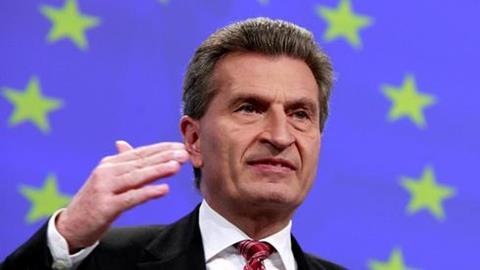Commissioners singing from different song sheets as European funders reiterate their views on Digital Single Market strategy

European Commissioners Ansip and Oettinger appear to be singing from different song sheets on their proposed Digital Single Market (DSM) strategy.
While Digital Economy and Society Commissioner Günther Oettinger was striking conciliatory tones over the European film and TV industries’ concerns about Brussels’ copyright reform plans, his superior, European Commission Vice-President Andrus Ansip, has not wavered from a harder line, particularly on the issue of geo-blocking.
Speaking in the European Parliament’s plenary at the same time as Oettinger was meeting the EU’s culture and media ministers, Ansip responded to MEPs’ questions about specific aspects of the DSM strategy by declaring: “When we talk about copyright reform, we do not want to change the release window system, such as six months for movies in cinemas.”
“It is up to the industry to say for how long a period of time they would like to keep those movies in cinemas. If six months, then six months, if 16, then 16, if 60 months, then once again it is up to the industry and not to the Commission to say how long a period of time the producers would like to keep their movies in cinemas. It is a question about entrepreneurial freedom as understand it.”
“Regarding DVDs, once again it is up to the industry to say for how long a period they would like to keep those movies on DVD,” he continued.
However, he showed that he has yet to understand the working of the film industry’s business model by adding: “When it comes to video on demand, I would like to ask for cross-border access to content and for portability of the content.”
While fellow Commissioner Oettinger spoke about the need to focus on combatting piracy during his meeting with European filmmakers in Cannes last week, this issue was only touched in passing by Ansip during his meeting with the MEPs.
“We have to tackle piracy,” he noted. “but first we have to provide legal access to digital content for our people.”
During the debate, UK MEP Vicky Ford had stressed that “enabling portability must not create a back door for piracy. Creators do need to know that their work, their copyright, has value and can be enforced,” while Germany’s Sabine Verheyen called for a “balanced position” between creators’ rights and consumer demand to access digital content across national borders.
Meanwhile, Greens MEP Jan Philipp Albrecht remarked: “I think you have made some good points, but there needs to be clear legislation, concrete formulations, about what you mean – for example – on platform neutrality and on geo-blocking; that is not enough, please try to improve the concreteness of these proposals.”
Euro funders set out more detailed response
The EC’s plans for the development of a Digital Single Market were also the subject of a more detailed position paper drawn up by European national film funders gathered in the Brussel-based Association of the European Film Agency Directors (EFADs).
The EFADs had initially set out general principles in a first paper in mid-March indicating that they considered the current EU copyright framework to be “fit for purpose” and argued that the priority of the EU “should be the establishment of a level playing field ensuring equal treatment between all operators, a commitment to economic sustainability and engagement in the creation of local works.”
In the latest position paper, the agencies said that they were “eager to seize the opportunities” presented by the DSM as they believed these would provide “the basis for the increased circulation of European films, to the benefit of the European film industry and Europe’s citizens.”
The paper’s recommendations suggested that Europe “should welcome the digital players as long as they are committed to take part in keeping the market sustainable as a distinct European market” and that a future EU legal framework should be aimed at “creating a level playing field between all European and global market players” with “an equal commitment from all market players in the creation of local content and respect for national rules and common European values.
While calling for the territoriality principle to be maintained in a future copyright reform, the agencies stressed that this principle “is not the same as, nor a defence of ‘geoblocking’.”
“Instead, it should be regarded as a crucial tool to create a balance in negotiations between the supply side (the creators and producers) and the demand side (the media services),” they suggested,
The EFADs explained that they will draw up detailed responses as the Commission publishes specific policy proposals in different areas in the coming months.
EU to launch new prize
The European Union is to launch a new prize – the STARTS Prize - to recognise collaboration between arts and innovation, science and technology (ICT).
The STARTS Prize will be in the broader context of European innovation activities as part of the EU’s STARTS initiative and will give visibility to the impact on innovation that the most forward-looking collaborations have achieved.
DG Connect’s new initiative and its plans for the prize were presented today (May 26) at a symposium held in the Belgian city of Mons on “Crossovers Culture & Technology”.
The symposium’s speakers included Michel Magnier, Director of Culture and Creativity at DG Culture and the MEDIA Programme chief Lucia Recalde Langarica. (ends)

























No comments yet